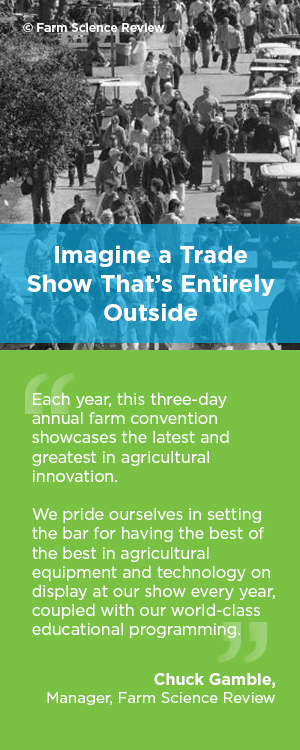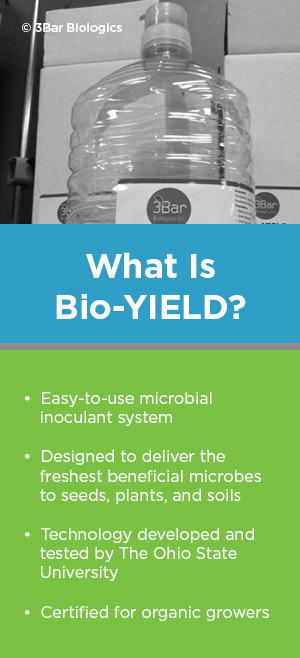3Bar Biologics: Working with Farmers to Produce Better Crop Yields More Sustainably
When a startup exhibits its products at an industry conference—especially when that conference features over one hundred thousand people viewing hundreds of exhibitors that are spread over acres and acres of land—the goal isn’t usually to be the company displaying the smallest, most invisible product on the scene.
 But that’s exactly what 3Bar Biologics set out to do this week at the 53rd Farm Science Review (FSR) held at the Molly Caren Agricultural Center two miles north of London, OH on US route 40.
But that’s exactly what 3Bar Biologics set out to do this week at the 53rd Farm Science Review (FSR) held at the Molly Caren Agricultural Center two miles north of London, OH on US route 40.
“FSR is the largest university sponsored farm show in the country,” “Many farmers rent golf carts just to get around. It’s too many miles to walk,” said Bruce Caldwell, 3Bar Biologics CEO and founder.
The “secret sauce” in 3Bar’s Bio-YIELD microbial inoculant system, are unique microorganisms that are so tiny they only show up under a high-powered microscope.
“Everything new and innovative in farming is here,” Caldwell said, “from monstrous planters and field demonstrations of new machinery actually harvesting corn to goji berries and data collecting drones, to the latest technologies in ‘natural’ farming. We fit right in.”
Healthier crops, higher yields, improved margins
In Bio-YIELD, 3Bar Biologics provides natural, beneficial microorganisms that promote crop health, enhance quality, and improve yields.
Upon activation, each drop of Bio-YIELD contains millions of Pseudomonas fluorescens bacteria which are locally adapted especially for the Ohio region’s growing conditions.
These “good” bacteria are applied to the soil once at planting. As the roots of the corn or soybean grow, the bacteria grow, too, doing many good things for the plants. They solubilize nutrients, especially phosphorous, and stimulate the plant’s immune system to help it fight stresses during the growing season.
 “What makes 3Bar’s product unique in the marketplace is that we deliver a more viable and alive population of bacteria. It’s the freshest living microbe product in the world because it’s activated at the point of use,” Caldwell said.
“What makes 3Bar’s product unique in the marketplace is that we deliver a more viable and alive population of bacteria. It’s the freshest living microbe product in the world because it’s activated at the point of use,” Caldwell said.
3Bar has developed a unique, simple to use delivery system that the grower can activate right at the farm. That means the bacteria remain dormant and protected in an optimally conditioned chamber until the farmer is ready to plant.
The bacteria are pampered in that small chamber. They receive a balanced food source and enjoy the right balance of moisture and oxygen. Then when it is time to plant, the farmer simply pushes a button to activate, dropping them into a growth chamber filled with liquid and gas, where they grow like crazy.
Then the product is applied to the field at planting. One jug, small enough to lift with one hand, covers about 40 acres. The application of the product fits into farmers’ current planting practices, which means they don’t have to change the way they are doing things. Once applied to the soil, they can colonize and help the plant throughout the growth cycle.
“This is a very cost effective system,” Caldwell said. “We don’t ship a lot of dead bacteria. They remain in a sealed, protected environment, until the farmer is ready to activate them. We expect that to produce a consistent result and high return on investment for the farmer.”
Right now, 3Bar’s target market is family farms with an average of 1,000 acres. There are about 25,000 in that range just in Ohio, Indiana, and Michigan.
3Bar meets the farmers where they are.
“It’s a challenging time in agriculture right now,” Caldwell said. “The price that farmers can get for corn and soybeans is extremely depressed. Farmers stand to make much less profit than two years ago.”
Although it’s a tough time to ask a farmer to experiment, Caldwell says that there are two ways to think about that.
“Do you hunker down and do what your daddy and your granddaddy did and hope for the best,” he said. “Or do you say, I have to innovate, and do things differently.”
Early experiences suggest that Bio-Yield can increase a farmer’s yield by 3 to 5 percent on average, with some fields yielding much greater depending on the stresses it has endured.
“If a farmer can spend five dollars to make twenty-five, they’ll give that a try,” Caldwell said. “With our product, the farmer can make a greater return, our distributors make good margins, and we generate the profit we need to grow and expand.”

